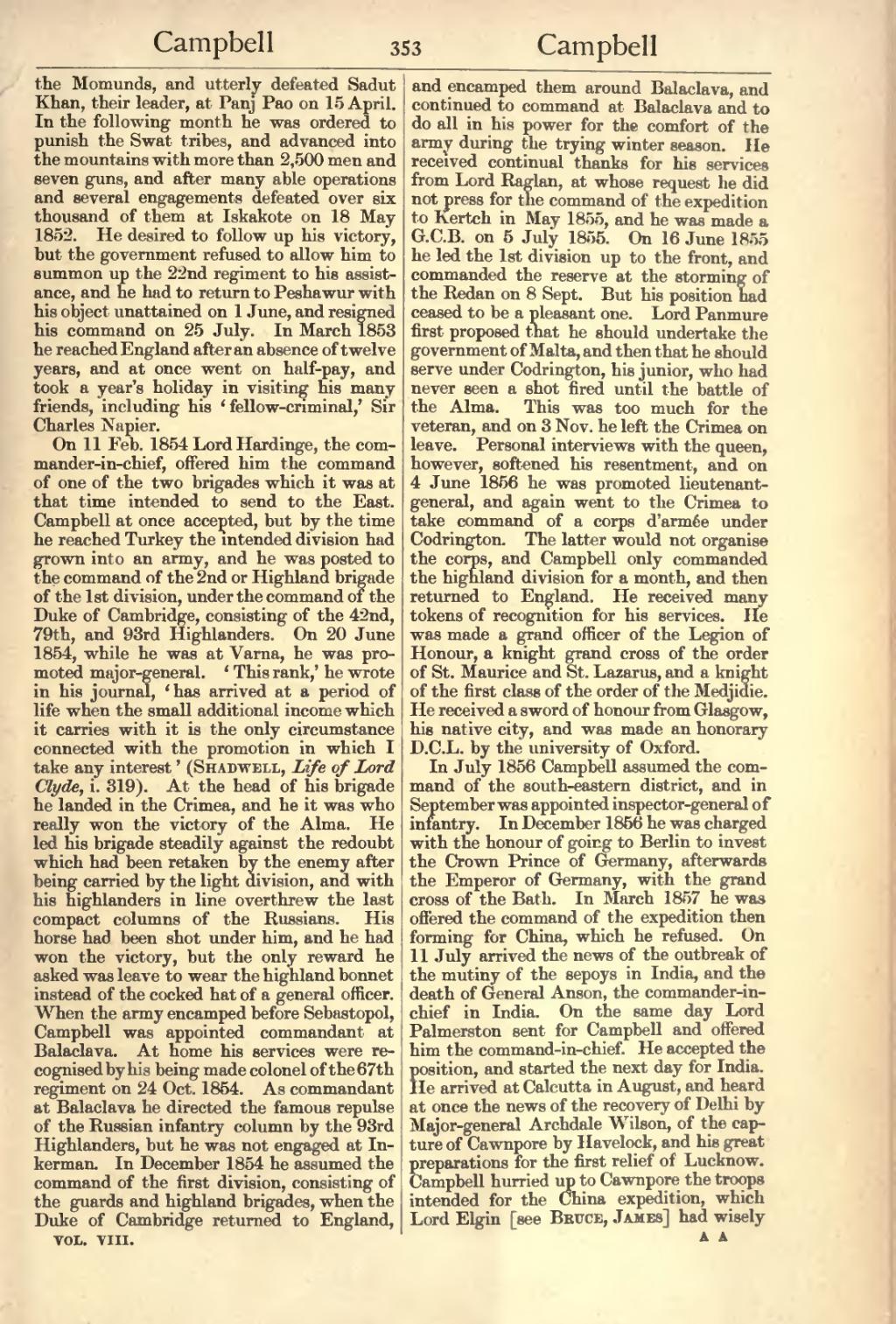the Momunds, and utterly defeated Sadut Khan, their leader, at Panj Pao on 15 April. In the following month he was ordered to punish the Swat tribes, and advanced into the mountains with more than 2,500 men and seven guns, and after many able operations and several engagements defeated over six thousand of them at Iskakote on 18 May 1852. He desired to follow up his victory, but the government refused to allow him to summon up the 22nd regiment to his assistance, and he had to return to Peshawur with his object unattained on 1 June, and resigned his command on 25 July. In March 1853 he reached England after an absence of twelve years, and at once went on half-pay, and took a year's holiday in visiting his many friends, including his ‘fellow-criminal,’ Sir Charles Napier.
On 11 Feb. 1854 Lord Hardinge, the commander-in-chief, offered him the command of one of the two brigades which it was at that time intended to send to the East. Campbell at once accepted, but by the time he reached Turkey the intended division had grown into an army, and he was posted to the command of the 2nd or Highland brigade of the 1st division, under the command of the Duke of Cambridge, consisting of the 42nd, 79th, and 93rd Highlanders. On 20 June 1854, while he was at Varna, he was promoted major-general. ‘This rank,’ he wrote in his journal, ‘has arrived at a period of life when the small additional income which it carries with it is the only circumstance connected with the promotion in which I take any interest’ (Shadwell, Life of Lord Clyde, i. 319). At the head of his brigade he landed in the Crimea, he it was who really won the victory of Alma. He led his brigade steadily against the redoubt which had been retaken by the enemy after being carried by the light division, and with his highlanders in line overthrew the last compact columns of the Russians. His horse had been shot under him, and he had won the victory, but the only reward he asked was leave to wear the highland bonnet instead of the cocked hat of a general officer. When the army encamped before Sebastopol, Campbell was appointed commandant at Balaclava. At home his services were recognised by his being made colonel of the 67th regiment on 24 Oct. 1854. As commandant at Balaclava he directed the famous repulse of the Russian infantry column by the 93rd Highlanders, but he was not engaged at Inkerman. In December 1854 he assumed the command of the first division, consisting of the guards and highland brigades, when the Duke of Cambridge returned to England, and encamped them around Balaclava, and continued to command at Balaclava and to do all in his power for the comfort of the army during the trying winter season. He received continual thanks for his services from Lord Raglan, at whose request he did not press for the command of the expedition to Kertch in May 1855, and he was made a G.C.B. on 5 July 1855. On 16 June 1855 he led the 1st division up to the front, and commanded the reserve at the storming of the Redan on 8 Sept. But his position had ceased to be a pleasant one. Lord Panmure first proposed that he should undertake the government of Malta, and then that he should serve under Codrington, his junior, who had never seen a shot fired until the battle of the Alma. This was too much for the veteran, and on 3 Nov. he left the Crimea on leave. Personal interviews with the queen, however, softened his resentment, and on 4 June 1856 he was promoted lieutenant-general, and again went to the Crimea to take command of a corps d'armée under Codrington. The latter would not organise the corps, and Campbell only commanded the highland division for a month, and then returned to England. He received many tokens of recognition for his services. He was made a grand officer of the Legion of Honour, a knight grand cross of the order of St. Maurice and St. Lazarus, and a knight of the first class of the order of the Medjidie. He received a sword of honour from Glasgow, his native city, and was made an honorary D.C.L. by the university of Oxford.
In July 1856 Campbell assumed the command of the south-eastern district, and in September was appointed inspector-general of infantry. In December 1856 he was charged with the honour of going to Berlin to invest the Crown Prince of Germany, afterwards the Emperor of Germany, with the grand cross of the Bath. In March 1857 he was offered the command of the expedition then forming for China, which he refused. On 11 July arrived the news of the outbreak of the mutiny of the sepoys in India, and the death of General Anson, the commander-in-chief in India. On the same day Lord Palmerston sent for Campbell and offered him the command-in-chief. He accepted the position, and started the next day for India. He arrived at Calcutta in August, and heard at once the news of the recovery of Delhi by Major-general Archdale Wilson, of the capture of Cawnpore by Havelock, and his great preparations for the first relief of Lucknow. Campbell hurried up to Cawnpore the troops intended for the China expedition, which Lord Elgin [see Bruce, James] had wisely
